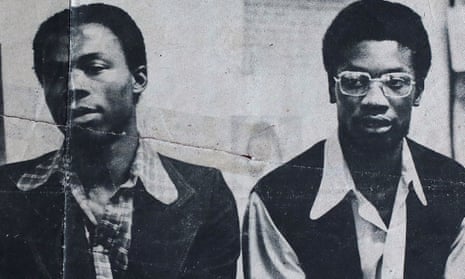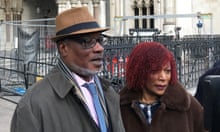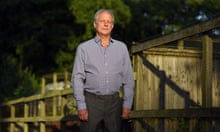Nearly 50 years after they were jailed for theft and assaulting the police in a highly controversial case in which they claimed to have been framed and beaten, four black men from south London could finally be cleared.
Winston Trew, Sterling Christie, George Griffiths and Constantine “Omar” Boucher were arrested in March 1972 after a group of undercover police officers confronted them at Oval underground station and aggressively accused them of “nicking handbags” on the tube. They were held overnight, beaten in the cells and charged with attempting to steal, theft, and assault of the police.
After a five-week trial at the Old Bailey, all four were convicted and jailed for two years in November 1972. At the time, mugging was a high-profile issue and routinely blamed on young black men.
Last year, after another case involving the corrupt officer who led the operation that resulted in a conviction being overturned last year, one of the “Oval Four” applied to the Criminal Cases Review Commission. It is now referring the convictions to the court of appeal. The CCRC only refers a small number of cases each year and submission is typically viewed as highly likely to result in success. “It has been a long time coming,” said Trew, now 69. “Finally we are getting justice.”

The campaign in support of the Oval Four after their conviction featured marches and meetings at Lambeth town hall in Brixton. Eventually they were granted an appeal at which they were represented by the distinguished barrister, John Platts-Mills QC. Their sentences were reduced but their convictions upheld. The appeal court judge, Lord Justice James, told them that he hoped they appreciated the “gravity” of their offences and would not see the small reduction of their sentences as a “sign of weakness”.
The detective sergeant who led the arrests was Derek Ridgewell, who had previously served with the Southern Rhodesian (now Zimbabwean) police. His practice, which led to many convictions, was to confront young black men at underground stations, accuse them of theft and then attribute incriminating remarks to them. If they resisted arrest, they were also accused of assaulting the police.
Along with the Oval Four, he also arrested those who became known as the Stockwell Six, the Waterloo Four and the Tottenham Court Road Two. It was during the last of these cases that the courts finally realised that something was amiss. The two young men arrested at Tottenham Court Road underground station in 1973 were devout Jesuit students from Oxford University and the judge, Gwyn Morris, halted their trial and said: “I find it terrible that here in London people using public transport should be pounced upon by police officers without a word.”
Ridgewell was quietly moved to a post investigating mail theft. He joined forces with a pair of career criminals with whom he split the proceeds from stolen mailbags before finally being arrested himself and jailed for seven years. Asked by the governor at Ford prison how he had become involved, his response was: “I just went bent.” At the age of 37, he suffered a heart attack in jail and died.
During his time on the mail theft squad, he used a similar arrest technique on three young white men who thought, when they were approached by the police in their car in south London, that it was merely because the music on their car radio was too loud. They soon found themselves charged with mailbag theft and being told by the duty solicitor that it would be inadvisable to accuse the police of lying when they came to court. They continued to protest in favour of their innocence but were all jailed in 1976.
One of their number, Stephen Simmons, who became a successful businessman, was always angered by his conviction, not least because his own parents did not believe the police would lie. A few years ago, he decided to investigate the case and came across the information that the man who had arrested him was himself a mailbag thief. He also found Trew’s book, Black for a Cause, which included his research on Ridgewell.
Adam Bell, a case worker for the CCRC, investigated the case and it was referred to the court of appeal. Simmons’s conviction was quashed last year. The lord chief justice, Lord Burnett, expressed regret that the case had taken so long to come back to court and said that the evidence before him was “extremely telling”.
After being cleared, Simmons, now 63, said: “That man Ridgewell ruined three lives for no reason and I am sure many, many more and if this can help someone else who was also arrested by him then at least something will have been achieved.”
This week he reacted to the news of Trew’s case, saying: “I am very happy to hear Winston’s news. The more the merrier.”
The CCRC said it had been a complex case to investigate. Helen Pitcher, CCRC chair, said: “The age of the case meant that almost all of the information that we usually have to go on – such as police material and prosecution and court files – had long ago been destroyed so we had to go to great lengths to piece things together.”
Trew paid tribute to his CCRC case worker, Anona Bisping, saying: “She did a fantastic job of pulling everything together.”
Trew, along with Christie, will now have their cases referred to the court of appeal. The other two left the UK many years ago and could not be contacted but their cases would also automatically be referred back if they were ever found.






